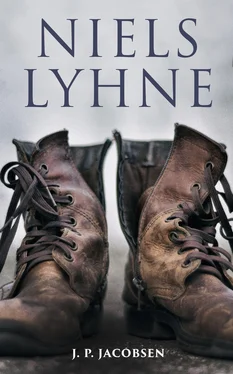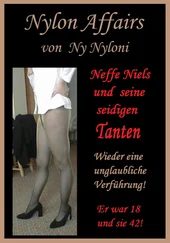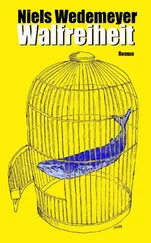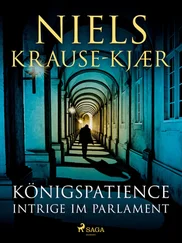J. P. Jacobsen - Niels Lyhne
Здесь есть возможность читать онлайн «J. P. Jacobsen - Niels Lyhne» — ознакомительный отрывок электронной книги совершенно бесплатно, а после прочтения отрывка купить полную версию. В некоторых случаях можно слушать аудио, скачать через торрент в формате fb2 и присутствует краткое содержание. Жанр: unrecognised, на английском языке. Описание произведения, (предисловие) а так же отзывы посетителей доступны на портале библиотеки ЛибКат.
- Название:Niels Lyhne
- Автор:
- Жанр:
- Год:неизвестен
- ISBN:нет данных
- Рейтинг книги:4 / 5. Голосов: 1
-
Избранное:Добавить в избранное
- Отзывы:
-
Ваша оценка:
- 80
- 1
- 2
- 3
- 4
- 5
Niels Lyhne: краткое содержание, описание и аннотация
Предлагаем к чтению аннотацию, описание, краткое содержание или предисловие (зависит от того, что написал сам автор книги «Niels Lyhne»). Если вы не нашли необходимую информацию о книге — напишите в комментариях, мы постараемся отыскать её.
Niels Lyhne — читать онлайн ознакомительный отрывок
Ниже представлен текст книги, разбитый по страницам. Система сохранения места последней прочитанной страницы, позволяет с удобством читать онлайн бесплатно книгу «Niels Lyhne», без необходимости каждый раз заново искать на чём Вы остановились. Поставьте закладку, и сможете в любой момент перейти на страницу, на которой закончили чтение.
Интервал:
Закладка:
And no one suspected what dwelt within him—all passed him by unseeing. But he rejoiced in their blindness and felt his contempt for humanity growing. A day would come when the light of his eye would go out, and the magnificent structure of his mind would crumble to its foundations and become as that which had never been, but no work from his hand, no, not a line, would he leave to tell the tale of what had been lost in him. His genius should not be crowned with thorns by the world’s misjudgment, neither should it wear the defiling purple cloak of the world’s admiration. He exulted at the thought that generation after generation would be born and die, and the greatest men of all ages would spend years of their life in the attempt to gain what he could have given them if he had chosen to open his hand.
The fact that he lived in such a humble fashion gave him a curious pleasure, simply because there was such a magnificent extravagance in using his mind to teach children, such a wild incongruity in paying for his time with mere daily bread, and such a colossal absurdity in allowing him to earn this bread upon the recommendation of poor, ordinary mortals, who had vouched for him that he knew enough to take upon himself the miserable task of a tutor. And they had given him non in his examination for a degree!
Oh, there was rapture in feeling the brutal stupidity of an existence that cast him aside as poor chaff and valued as golden grain the empty husks, while he knew in his own mind that his lightest thought was worth a world!
Yet there were other times when the solitude of his greatness weighed upon him and depressed him.
Ah, how often, when he had communed with himself in sacred silence, hour after hour, and then returned again to consciousness of the audible, visible life round about him, had he not felt himself a stranger to its paltriness and corruptibility. Then he had often been like the monk who listened in the monastery woods to a single trill of the paradise bird and, when he came back, found that a century had died. Ah, if the monk was lonely with the generation that lived among the groves he knew, how much more lonely was the man whose contemporaries had not yet been born.
In such desolate moments he would sometimes be seized with a cowardly longing to sink down to the level of the common herd, to share their low-born happiness, to become a native of their great earth and a citizen of their little heaven. But soon he would be himself again.
The other newcomer was Edele Lyhne, Lyhne’s twenty-six-year-old sister. She had lived many years in Copenhagen, first with her mother, who had moved to the city when she became a widow, and, after her mother’s death, in the home of a wealthy uncle, Councillor of State Neergaard. The Neergaards entertained on a large scale and went out a great deal, so Edele lived in a whirl of balls and festivities.
She was admired wherever she went, and envy, the faithful shadow of admiration, also followed her. She was talked about as much as one can be without having done anything scandalous, and whenever men discussed the three reigning beauties of the town there were always many voices in favor of striking out one name and substituting that of Edele Lyhne, but they could never agree on which of two others should yield to her—as for the third, it was out of the question.
Yet very young men did not admire her. They were abashed in her presence, and felt twice as stupid as usual when she listened to them with her look of mild toleration—a maliciously emphasized toleration which crushed them with a sense that she had heard it all before and knew it by heart. They made efforts to shine in her eyes and their own by assuming blasés airs, by inventing wild paradoxes, or, when their desperation reached a climax, by making bold declarations; but all these attempts, jostling and crowding one upon the other in the abrupt transitions of youth, were met with the faint shadow of a smile, a deadly smile of boredom, which made the victim redden and feel that he was the one hundred and eleventh fly in the same merciless spider’s web.
Moreover, her beauty had neither the softness nor the fire to ensnare young hearts. On older hearts and cooler heads she exercised a peculiar fascination.
She was tall. Her thick, heavy hair was blonde with the faint reddish sheen of ripening wheat, but fairer and curling where it grew in two points low on the nape of her neck. Under the high, clean-cut forehead, her eyebrows were pale and indefinite. The light gray eyes were large and clear, neither accented by the brows nor borrowing fitful shadows from the thin, delicate lids. There was something indeterminate and indeterminable in their expression. They always met you with a full and open gaze, without any of the changeful play of sidelong glances or lightning flashes, but almost unnaturally wakeful, invincible, inscrutable. The vivacity was all in the lower part of the face, the nostrils, the mouth, and the chin. The eyes merely looked on. The mouth was particularly expressive. The lips met in a lovely bow with deep, gracious curves and flexible lines, but their beauty was a little marred by a hardness of the lower lip, which sometimes melted away in a smile, and then again stiffened into something akin to brutality.
The bold sweep of the back and the luxuriant fullness of the bosom, contrasted with the classic severity of the shoulders and arms, gave her an audacity, an exotic fascination, which was enhanced by the gleaming whiteness of her skin and the morbid redness of her lips. The effect was provocative and disquieting.
Her tall, slender figure had a subtle distinction, which she was clever enough to underscore, especially in her ball dresses, with sure and conscious art. In fact, her artistic sense applied to her own person would sometimes speak so loudly from her costume that it barely escaped a hint of bad taste even when most exquisitely tasteful. To many this seemed an added charm.
Nothing could be more punctiliously correct than her behavior. In what she said, and in what she permitted to be said, she kept within the strictest bounds of prudery. Her coquetry consisted in not being coquettish, in being incurably blind to her own power, and never making the slightest distinction between her admirers. For that very reason, they all dreamed intoxicating dreams of the face that must be hidden behind the mask; they believed in a fire under the snow and scented depravity in her innocence. None of them would have been surprised to hear that she had a secret lover, but neither would they have ventured to guess his name.
This was the way people saw Edele Lyhne.
She had left the city for Lönborggaard, because her health had suffered from the constant round of pleasures, the thousand and one nights of balls and masquerades. Toward the end of the winter, the doctor had declared her lungs to be affected, and had prescribed fresh air, quiet, and milk. All these things she found in abundance in her present abode, but she also found an unceasing boredom, which made her long for Copenhagen before a week had passed. She filled letter after letter with entreaties that she might be allowed to return from her exile, and hinted that homesickness did her more harm than the air did her good. But the doctor had so alarmed her uncle and aunt that they felt it their duty to turn a deaf ear to her lamentations, no matter how pathetic.
It was not so much the social diversions she pined for; it was rather that she craved the sense of feeling her own life mingling with the sound-filled air of the great city, whereas in the country the stillness in thoughts, in words, in eyes—in everything—made her feel as though she heard herself unceasingly and with inescapable distinctness, just as one hears a watch ticking through a sleepless night. And to know that over there they were living exactly as before—it was as if she were lying dead in the quiet night and heard the strains of music from a ballroom stealing on the air over her grave.
Читать дальшеИнтервал:
Закладка:
Похожие книги на «Niels Lyhne»
Представляем Вашему вниманию похожие книги на «Niels Lyhne» списком для выбора. Мы отобрали схожую по названию и смыслу литературу в надежде предоставить читателям больше вариантов отыскать новые, интересные, ещё непрочитанные произведения.
Обсуждение, отзывы о книге «Niels Lyhne» и просто собственные мнения читателей. Оставьте ваши комментарии, напишите, что Вы думаете о произведении, его смысле или главных героях. Укажите что конкретно понравилось, а что нет, и почему Вы так считаете.












